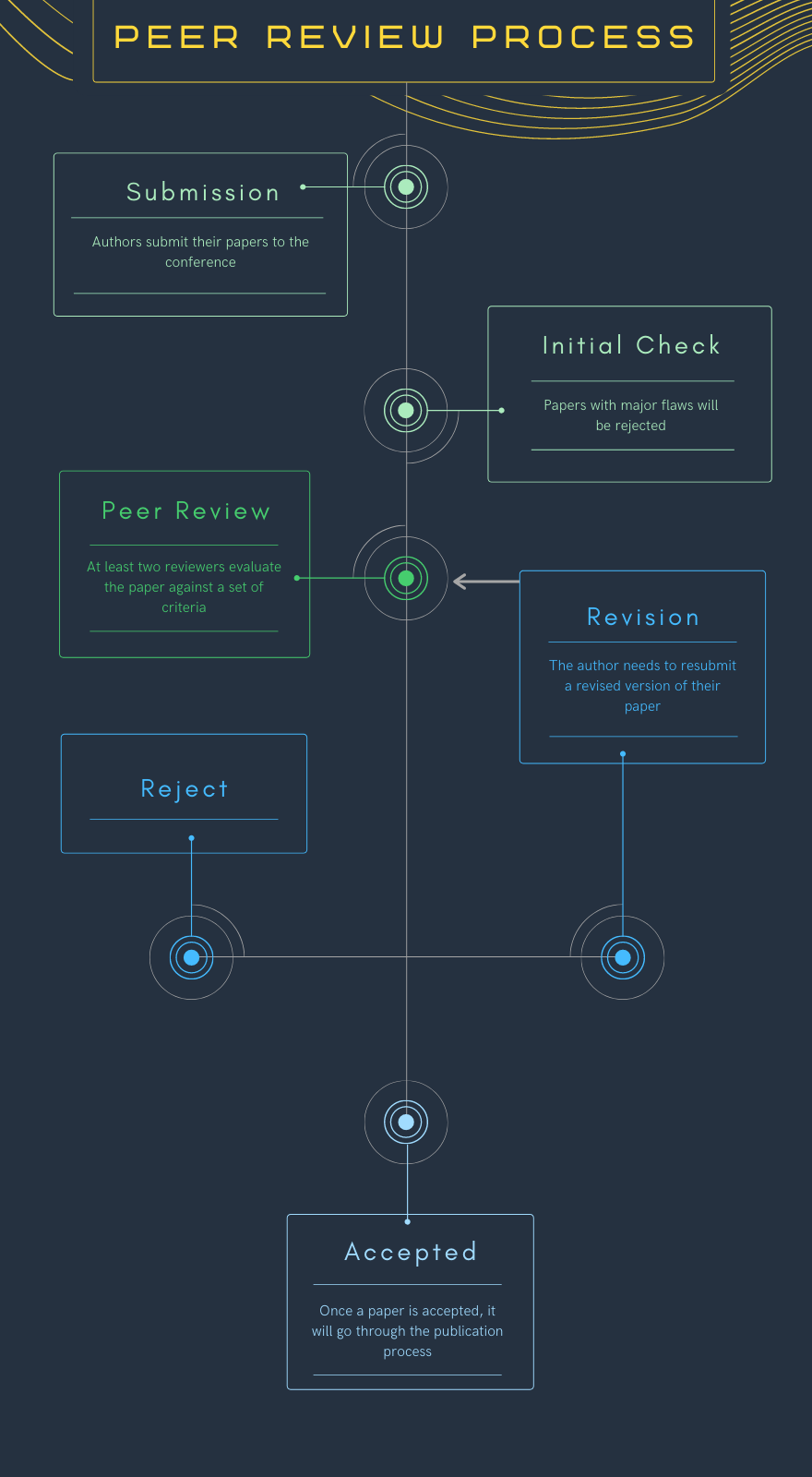Peer-reviewing is of vital importance to ensure the scientific quality of conference papers. Papers submitted to ICVISP are subject to transparent, unprejudiced and efficient peer review, which is carried out by dedicated editors (assumed by Program Chair, Program Co-Chair and committee members appointed by Conference Chair) and reviewers.
The editorial process of a paper consists of two parts: Initial Check and Peer Review. Note that, only full paper will be assigned for peer review. Abstracts submitted to ICVISP are assessed by the editor to decide whether accept for the conference presentation.
The paper will be sent to an editor for initial check. Once passing the initial check, it will be assigned to two reviewers of the relevant research areas for peer review. A minimum of two reviewers will carefully review the manuscript and report their recommendations to the editor. After authors' revisions (if requested by the editor), the editor will make the ultimate acceptance or rejection decision for the paper.
During the editorial process, conference support team take the responsibility of coordination between the publisher and authors, copyediting work and other necessary publication support.
Type of Review
Double-Blind
Initial Check
Generally speaking, the initial check feedback is available in 3 working days. The papers will be checked in terms of topic, layout, structure, page, language, plagiarism, self-plagiarism, reference, figure and table quality. The paper can be sent to double-blind peer-review only if the paper passed the Initial Check.
Minimum number of reviews per paper
2-3
Criteria
Papers accepted to the conference and presented will be involved in the conference proceedings and publish with a collaborative publisher.
Language
The manuscripts submitted to the conference should be written in English, which is required to be inclusive, appropriate and understandable for editors, reviewers and future readers. Please use proper grammar, fluent sentence, choose good word and avoid syntax error in your paper. Authors should be aware that comprehension difficulties may lead to rejection of the paper.
Relevance
Papers presenting the study of authors should fit within the scope of the conference. Authors are suggested to look through the Call for Paper to check topics of interest before submitting your paper. It’s welcome to send a query email to us if you have doubt on whether your work of study suits this conference.
Scientific Significance
With the publication of conference proceedings, your work will be presented to the scientific communities as well. Authors should guarantee the objectivity, reliability, validity and replication of results, and the presented research in the paper should be worth reading, publishing, and sharing from the perspective of editors and reviewers.
Scientific Rigor
Authors are accountable for conducting the research with scientific rigor and implementing the highest standards in their research from subject selection to data analysis. Sufficient details need to be provided to allow reviewers evaluate their work and other experts to replicate the research.
Presentation Quality
Data, analyses and results of the study should be presented in an appropriate way. High quality of presentation makes your reach easier to understand and removes obstacles in the peer review process.
Layout
Submitted papers should be well formatted. The conference provides templates to help authors typeset their manuscripts before submission. For late break submissions, please contact the conference support team for the latest templates.
Review Report
The editorial decision is made by the editor mostly on the comments reported by reviewers in the manuscript's field. Authors will be able to improve the work by receiving timely and constructive reviews including brief summary, broad comments and specific comments.
Decision and revision
Authors will get notified of these four possible feedbacks after the peer review process:
Accept
The paper is accepted and do not need any modification.
Accept with minor revisions
The paper will be accepted after minor revisions. In this case, the reviewed paper will only be reviewed by the editor.
Revaluate with major revisions
The paper will be sent to be reviewed by the original reviewers (unless they opt out) or assessed by the editor.
Reject
The paper will not be accepted due to major deficiencies. And it is not recommended to be resubmitted.
Note: Authors are entitled to lodge rebuttal or raise questions about the editorial comments.
Revision
All papers should go through no more than two rounds of peer review. The first round is conducted by peer reviewers assigned by the editor. If a revision is required, authors should return a revised manuscript in the allotted time. If they are unable to return it by the agreed deadline, they should inform the editor immediately. The editor has the authority to decide whether to accept the revised version of a manuscript, or send it to the original reviewers for a second round of peer review. If any of the reviewers opt out, the editor is accountable for inviting a reviewer alternatively.
Peer Review Process
